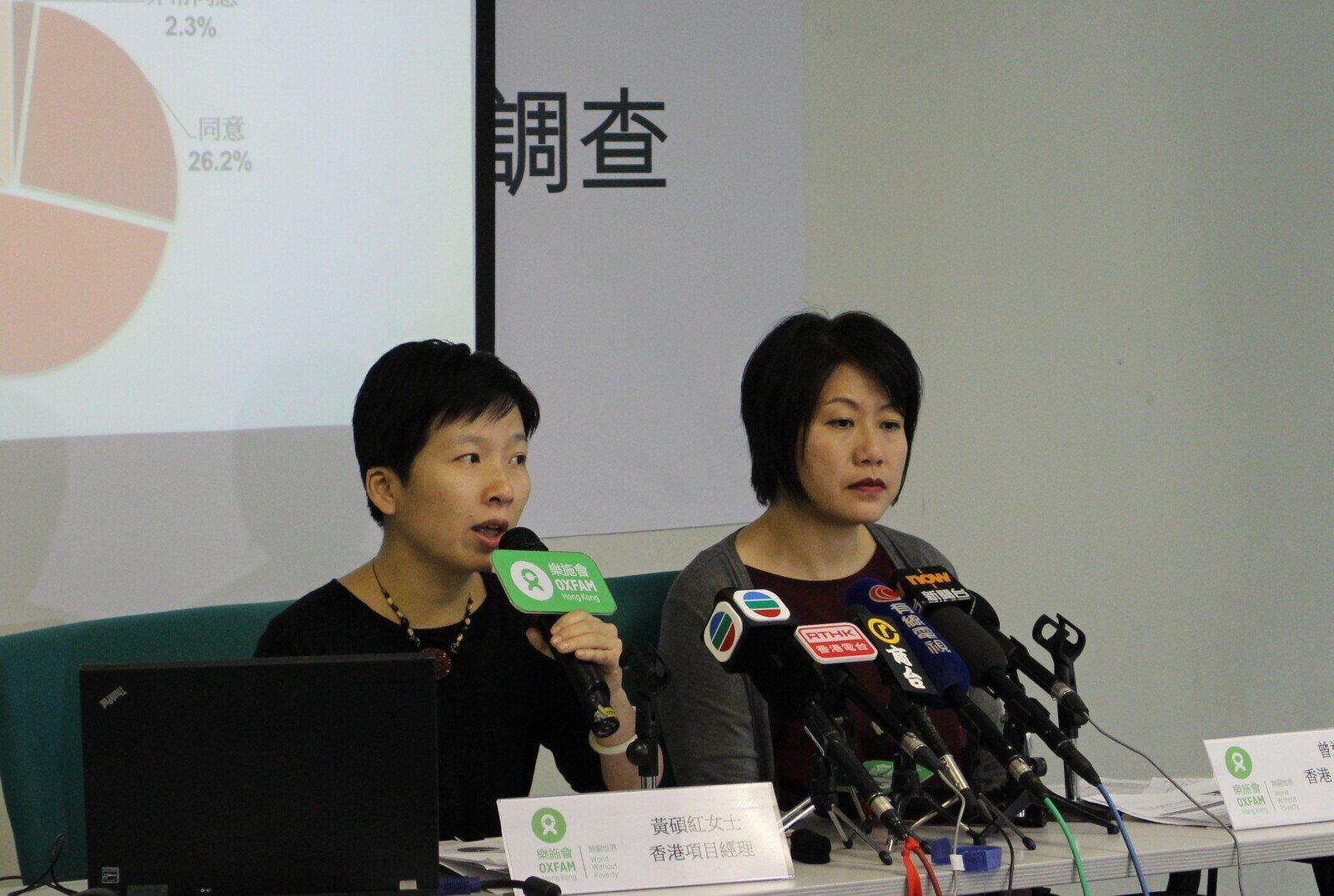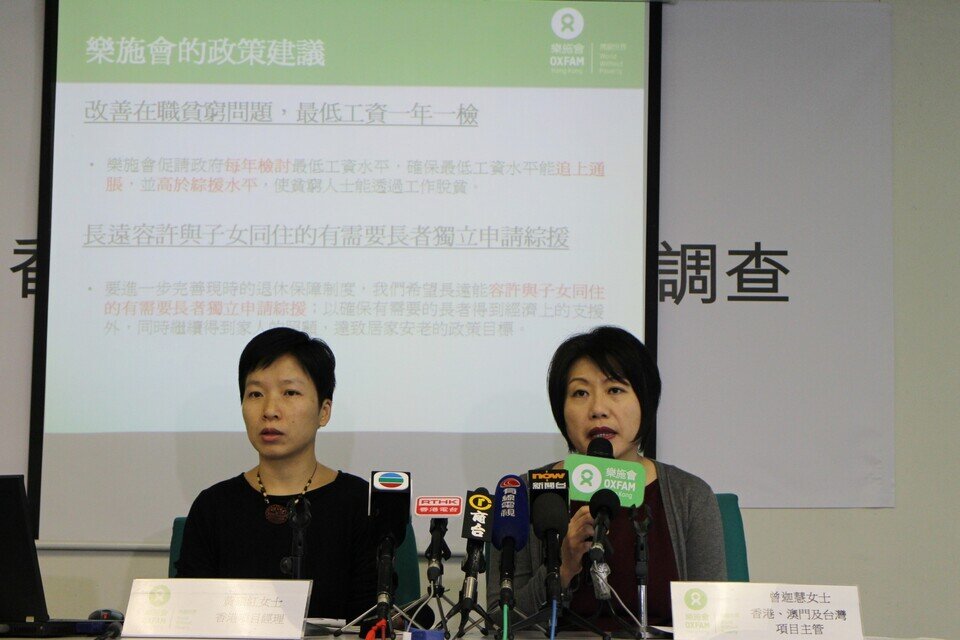02 MAR 2017
Poll: Hongkongers worry about elderly poverty most, nearly 90 pc agree that the government should take the lead in scrapping the MPF offsetting mechanism
Oxfam urges CE candidates to present comprehensive poverty alleviation platform
Oxfam’s latest report ‘Public Attitudes Towards Poverty in Hong Kong’ (Chi Only) reveals grave concern among the Hong Kong public towards poverty and the urgent need for the government to tackle poverty issues. Oxfam thus urges the government and Chief Executive (CE) candidates to formulate strong and comprehensive policy platforms to address poverty in Hong Kong.
Over half of the respondents believed that poverty in Hong Kong is serious, while 6.3 per cent felt it is very serious. More specifically, 40.3 per cent believed that elderly poverty is the most serious among poverty issues; this was followed by intergenerational poverty (19.1 per cent) and working poverty (14.4 per cent). A total of 36.3 per cent of respondents further attributed the main cause of poverty to the lack of a sound retirement protection system.
Results from the poll showed that 18- to 39-year-olds are most concerned about local poverty, with 65.4 per cent of them saying that poverty in Hong Kong is serious. When compared with people of other age groups, they are clearly more concerned about intergenerational poverty (30.7 per cent) and working poverty (19.1 per cent). Substantially more respondents from this age group believe that poverty exists because the tax system does not redistribute income anymore (27.5 per cent) and wage levels are too low (18.6 per cent).
Regarding elderly poverty, more than 70 per cent of respondents believed that having an MPF offsetting mechanism is unreasonable. Moreover, half of all respondents opposed to the government's newly proposed scheme of drawing a cutoff line and scrapping the MPF offsetting mechanism, while simultaneously lowering the current severance payment (SP) and long service payment (LSP) ratios. A further 6.3 per cent disagreed very much with this new proposal; 85.3 per cent of respondents felt that the government should take the lead in abolishing the MPF offsetting mechanism. Over 60 per cent of respondents agreed that the abolition of the so-called ‘bad son statement’ would enable more elderly people in need to apply for CSSA and be protected by social security measures.
With regard to working poverty, about 60 per cent believe the latest statutory minimum wage (HK$34.5) is not enough to sustain a family's monthly basic cost of living. Nearly a quarter of the respondents believe that a sufficient minimum wage level should range from HK$40 to HK$45/hour, while nearly 40 per cent believed that it should be HK$45 or more. Moreover, 60 per cent of respondents believed that employers are obliged to pay employees sufficient wages to meet their basic needs.
In terms of poverty among ethnic minorities, the largest number of respondents (38.9 per cent) believed that the most important cause for poverty among ethnic minorities is the lack of proficiency in the languages that are used locally (especially Chinese). Other reasons include personal factors (18.6 per cent) and discrimination (17.9 per cent). A total of 87.7 per cent of respondents believed that creating suitable Chinese teaching materials for non-Chinese students in kindergartens would be helpful for their future development.
As for poverty among women, 90 per cent of respondents believed that strengthening community services (child care or old age services) would – to some extent – improve employment opportunities for women who earn a low income. A total of 69.4 per cent of the remaining respondents felt that strengthening regulations on labour protection for part-time and casual workers would be more helpful to women, while others felt that increasing minimum wage (65.4 per cent) and promoting the development of bazaars in districts (52.2 per cent) would be more beneficial.
‘The report found that people in Hong Kong are generally concerned about poverty in Hong Kong, especially elderly poverty, and think many social policies are in great need of improvement. Oxfam believes that a just society should ensure that the poor have the right to lead a dignified life,’ said Oxfam’s Hong Kong Programme Manager, Wong Shek-hung. Oxfam urges the government to listen to public opinion and adopt progressive policy changes to address poverty. The organisation thus proposes the following:
First, regarding the MPF offsetting mechanism, the government should maintain current SP and LSP calculations as compensation for the dismissal of employees should not be confused with retirement protection. Moreover, the government, as the largest employer in the city, should take the lead in scrapping the MPF offsetting mechanism unconditionally for its contracted and outsourced employees.
Second, the government should review minimum wage annually as it has consistently lagged behind inflation. Annually reviewing the minimum wage can ensure that it keeps up with inflation and stays above the CSSA payment level, so that the poor can work their way out of poverty.
Oxfam welcomes the government’s move to abolish the bad son statement. To further improve the existing retirement protection system though, Oxfam urges the government to allow the elderly who live with their children to apply for CSSA individually.
With regard to poverty among women, the government should strengthen labour protection measures for those who are hired under ‘non-continuous contracts’ (commonly known as ‘non-418’). This would help to ensure that part-time or casual workers receive employment benefits according to their working hours, thus benefiting low-income women as most of them take up this kind of work. The government should also formulate policies on bazaars to help women increase their incomes.
Finally, to alleviate the poverty many ethnic minorities face, the government should enhance the support it provides non-Chinese speaking students. For example, it should provide a curriculum guide for teachers who teach non-Chinese speaking kindergarten students Chinese, and provide additional resources on a pro-rata basis to eligible kindergartens with fewer than eight NCS students, while requiring them to use the resources solely to hire Chinese teachers. Furthermore, the government should require a certain percentage of teachers to receive relevant professional education and training.
‘The three CE candidates should listen to the views reflected in the poll, and understand the public’s concerns about poverty in Hong Kong. We also urge them to consider our policy suggestions, form comprehensive poverty alleviation platforms and strengthen poverty alleviation measures,’ said Kalina Tsang, Head of Oxfam’s Hong Kong, Macau, Taiwan Programme.
Notes to editor:
Oxfam commissioned Chinese University of Hong Kong's Institute of Asia-Pacific Studies to conduct a public opinion poll between 5 and 17 January. A total of 2,151 Hong Kong residents aged 18 or above were interviewed; the response rate was 46.5 per cent and 1,001 valid questionnaires were received. So as to reflect Hong Kong’s population distribution, the data was weighted according to the latest gender and age distribution data published by the Census and Statistics Department.
- Ends -
About Oxfam
Oxfam is a worldwide development organisation that mobilises the power of people against poverty.
For media enquiries, please contact:
Wong Shek-hung Hong Kong Programme Manager | Clara Law Assistant Communications Officer |
Wong Shek-hung, Oxfam’s Hong Kong Programme Manager (left), and Kalina Tsang, Head of Oxfam’s Hong Kong, Macau, Taiwan Programme (right), announcing the release of Oxfam’s latest report. It reveals grave concern among the Hong Kong public towards poverty.
Wong Shek-hung (left) and Kalina Tsang(right) urge the government and CE candidates to formulate strong and comprehensive policy platforms to address poverty in Hong Kong.



